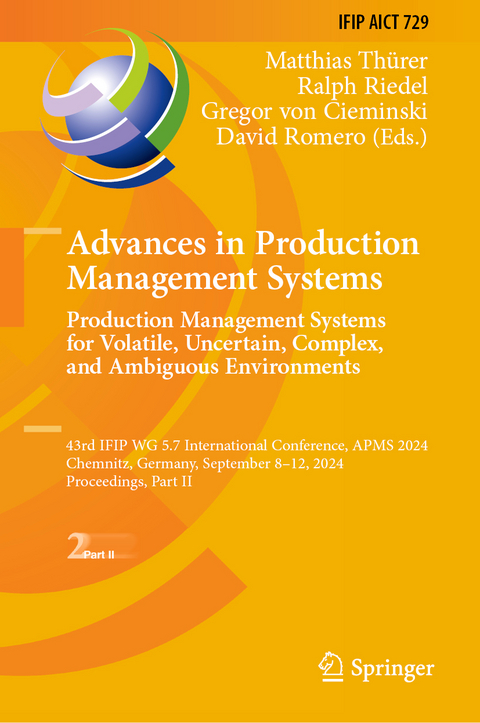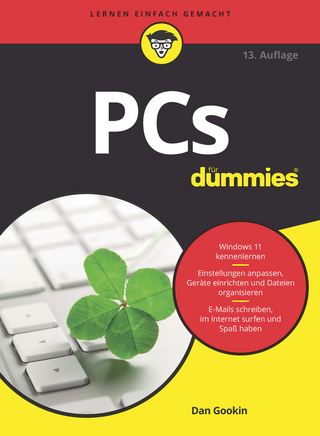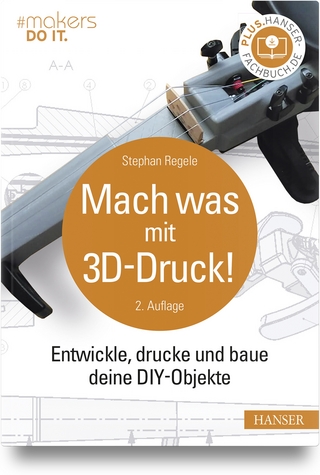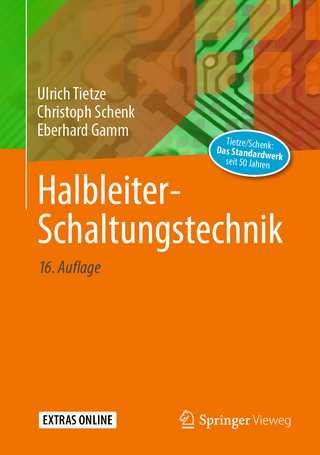
Advances in Production Management Systems. Production Management Systems for Volatile, Uncertain, Complex, and Ambiguous Environments
Springer International Publishing (Verlag)
978-3-031-65893-8 (ISBN)
The six-volume set IFIP AICT 728-729 constitutes the refereed proceedings of the 43rd IFIP WG 5.7 International Conference on Advances in Production Management Systems, APMS 2024, held in Chemnitz, Germany, during September 8-12, 2024.
The 201 full papers presented together were carefully reviewed and selected from 224 submissions. The APMS 2024 conference proceedings are organized into six volumes, covering a large spectrum of research addressing the overall topic of the conference "Production Management Systems for Volatile, Uncertain, Complex, and Ambiguous Environments".
Part I: advancing eco-efficient and circular industrial practices; barriers and challenges for transition towards circular and sustainable production processes and servitized business models; implementing the EU green deal: challenges and solutions for a sustainable supply chain; risk analysis and sustainability in an uncertain system in a digital era.
Part II: smart and sustainable supply chain management in the society 5.0 era; human-centred manufacturing and logistics systems design and management for the operator 5.0; inclusive work systems design: applying technology to accommodate individual workers' needs; evolving workforce skills and competencies for industry 5.0; experiential learning in engineering education.
Part III: lean thinking models for operational excellence and sustainability in the industry 4.0 era; human in command - operator 4.0/5.0 in the age of AI and robotic systems; hybrid intelligence - decision-making for AI-enabled industry 5.0; mechanism design for smart and sustainable supply chains.
Part IV: digital transformation approaches in production and management; new horizons for intelligent manufacturing systems with IoT, AI, and digital twins.
Part V: smart manufacturing assets as drivers for the twin transition towards green and digital business; engineering and managing AI for advances in asset lifecycle and maintenance management; transforming engineer-to-Order projects, supply chains, and systems in turbulent times; methods and tools to achieve the digital and sustainable servitization of manufacturing companies; open knowledge networks for smart manufacturing; applications of artificial intelligence in manufacturing; intralogistics.
Part VI: modelling supply chain and production systems; resilience management in supply chains; digital twin concepts in production and services; optimization; additive manufacturing; advances in production management systems.
.- Smart and Sustainable Supply Chain Management in the Society 5.0 Era.
.- Data-Driven Control System Using Machine Learning in Production Process.
.- Data-Driven Scheduling of Cellular Manufacturing Systems using Process Mining with Petri Nets.
.- A Study on Sophisticated Production Management for Engineer-to-Order Production: A Mixed Integer Programming Formulation for Production Scheduling.
.- Three-Dimensional Bin Packing Problems with the Operating Time of a Robot Manipulator.
.- AI Applications in the Healthcare Logistics and Supply Chain Sectors.
.- Analysis of Critical Success Factors of a Sustainable and Resilient AIoE-Based Supply Chain in Industry 5.0.
.- Trading Digital-Valued Assets within Cyber-Physical Manufacturing Supply Chains: A Scoping Review of Additive Manufacturing and Digital Trade.
.- Basic research on worker state prediction towards the realization of human digital twin.
.- Resilient supply chain network planning method with two-stage stochastic programming: Extension to multiple product supply chains.
.- Study on developing a comprehensive inspection system that parallel improves the accuracy of manual and automatic inspections.
.- Autonomous Vehicles: Technological Evolution and Obstacles to Implementation from a Brazilian Perspective.
.- Analysis of People's Continental Behavior Regarding Cycling in Light of The Cyclability Index.
.- Analytical and Computational Models for In-Store Shopper Journeys.
.- Human-centred Manufacturing and Logistics Systems Design and Management for the Operator 5.0.
.- A Meta-Heuristic Approach for Industry 5.0 Assembly Line Balancing and Scheduling with Human-Robot Collaboration.
.- Game-based design of a human-machine collaboration monitoring system.
.- Assessing Trustworthy Artificial Intelligence of Voice-enabled Intelligent Assistants for the Operator 5.0.
.- A Bibliometric Perspective of Integrating Labor Flexibility in Workload Control.
.- Integrating Ontology with Cobot Execution for Human-robot Collaborative Assembly using Heterogenous Cobots.
.- A Study on Production Scheduling Methods for Ready-Made Meal Industries.
.- Experimentation and evaluation of the usability of an AR-driven zero defect manufacturing solution in a real life complex assembly setting.
.- Enriching scene-graph generation with prior knowledge from work instruction.
.- Designing augmented reality assistance systems for Operator 5.0 solutions in assembly.
.- Inclusive Work Systems Design: Applying Technology to Accommodate Individual Workers' Needs.
.- An examination of the limited adoption of personalized work instructions in assembly to accommodate individual worker's needs.
.- Skills and information needed for Operator 5.0 in emergency production.
.- Augmenting the One-Work-Multiple-Machine (OWMM) System: An Industrial Softbot Approach.
.- Quantitative Models for Workforce Management in a Large Service Operation.
.- Evolving Workforce Skills and Competencies for Industry 5.0.
.- A State-of-the-Art Review and Framework for Human-Centric Automation in Industry 5.0.
.- Impact of Collaborative Robots on Human Trust, Anxiety, and Workload: Experiment Findings.
.- Integrating Industry 5.0 competencies: a learning factory based framework.
.- Strategies for managing the ageing workforce in manufacturing: a survey-based analysis.
.- Contemporary and Future Manufacturing - Unveiling the Skills Palette for Thriving in Industry 5.0.
.- Exploring the cognitive workload assessment according to human-centric principles in Industry 5.0.
.- Experiential Learning in Engineering Education.
.- Understanding the Drivers of Lean Learning in Industrial Environments.
.- Designing an Online Workshop for Creativity and Value Co-Creation: Three Case Studies in Gastronomic Sciences on Viewpoint Setting and Sustainability.
| Erscheinungsdatum | 07.09.2024 |
|---|---|
| Reihe/Serie | IFIP Advances in Information and Communication Technology |
| Zusatzinfo | XIV, 502 p. 166 illus., 129 illus. in color. |
| Verlagsort | Cham |
| Sprache | englisch |
| Maße | 155 x 235 mm |
| Themenwelt | Mathematik / Informatik ► Informatik ► Netzwerke |
| Informatik ► Weitere Themen ► Hardware | |
| Schlagworte | Advanced Management Systems • Advanced Production Systems • Artificial Intelligence • Collaborative Manufacturing & Services • Data-driven Production Management • Digital Supply Networks • Industry 4.0 • Information Technology • Production Management Theory • Smart Logistics • smart manufacturing • Smart Manufacturing and Industry 5.0 • Sustainable & Responsible Management |
| ISBN-10 | 3-031-65893-0 / 3031658930 |
| ISBN-13 | 978-3-031-65893-8 / 9783031658938 |
| Zustand | Neuware |
| Haben Sie eine Frage zum Produkt? |
aus dem Bereich


